
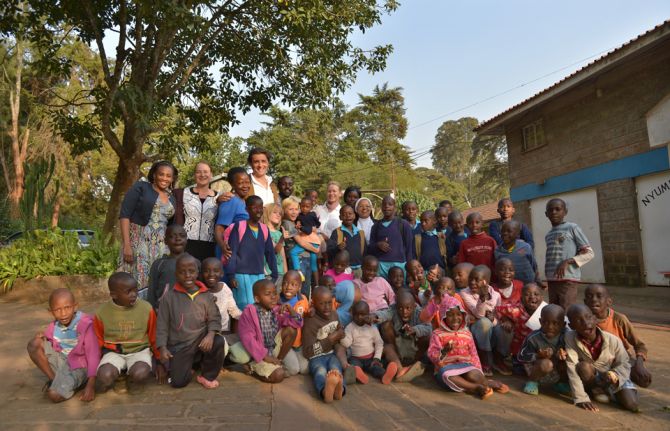
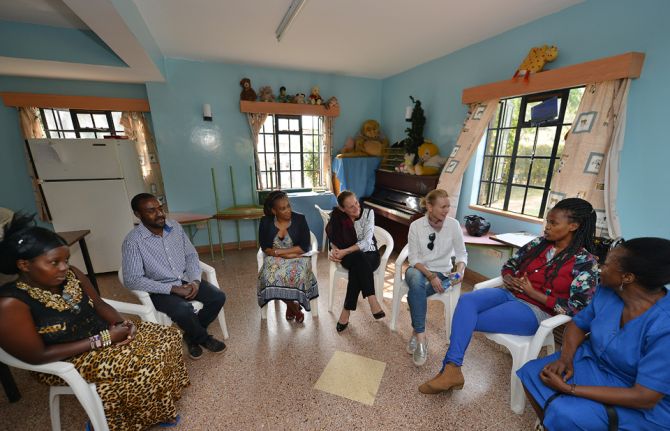
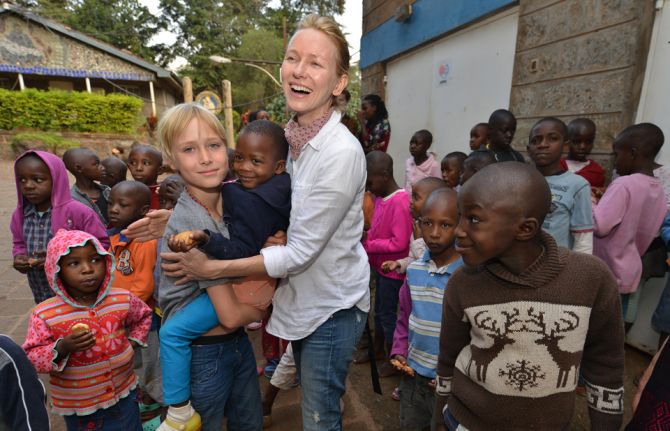
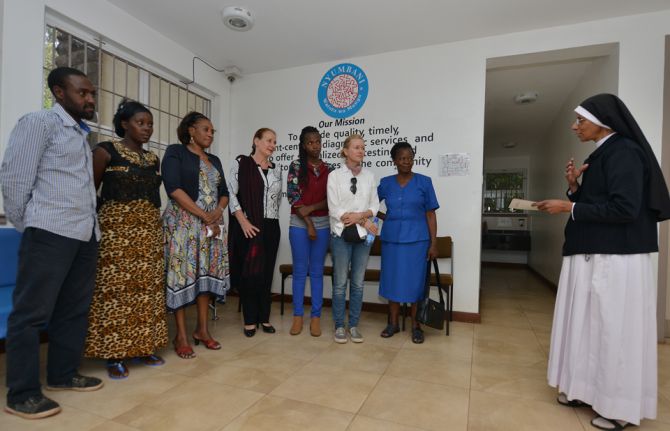
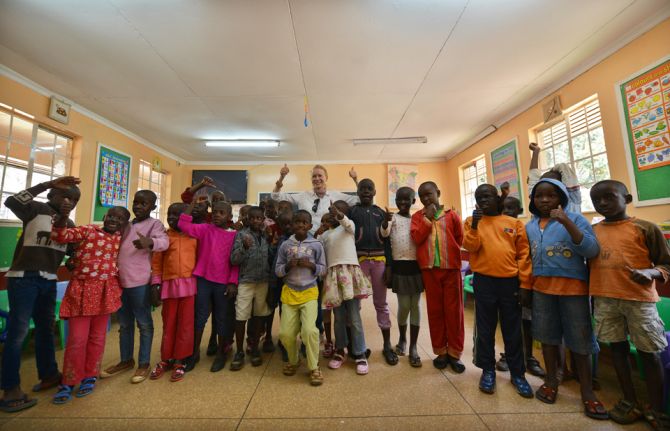
Update
Naomi Watts visits Nyumbani Children’s Home to learn about paediatric HIV treatment
12 July 2017
12 July 2017 12 July 2017Naomi Watts, UNAIDS Goodwill Ambassador, visited Nyumbani Children’s Home in Kenya on 11 July to learn about Kenya’s prevention of mother-to-child transmission of HIV programme and the work done in the home to care for children living with HIV.
In the space of just a few years, as the result of a strong partnership between political leadership, programme implementers and the community, new HIV infections among children aged 0–14 years in Kenya have fallen from 12 000 in 2013 to 6600 in 2015. In June, under the leadership of the First Lady, Margaret Kenyatta, Kenya launched a new framework to accelerate the country’s efforts towards elimination of mother-to-child transmission of HIV and syphilis. The framework calls for the elimination of stigma and discrimination and the creation of an environment that empowers women living with HIV.
Nyumbani Children’s Home opened in 1992 and is currently home to 124 children living with HIV. The home provides nutritional, medical, psychosocial and spiritual care to the children and to the surrounding community, providing a place of safety in Nairobi for abandoned children living with HIV. In addition, the organization has a community- based programme that supports more than 3100 children living with HIV who reside in the informal settlements of Nairobi and 1000 orphans in Nyumbani villages.
Mss Watts and her two sons visited several facilities in the home, including its state-of-art laboratory equipped to undertake early infant diagnosis and viral load testing. Ms Watts congratulated Nyumbani Children’s Home for the impact it makes on a daily basis in the lives of so many remarkable and empowered children. She committed to continue to create awareness of the need to ensure that children living with HIV remain AIDS-free.
Quotes
"Today I have witnessed incredible successes. The Nyumbani children are a living example of the impact of antiretroviral treatment on the health and well-being of children living with HIV.”
"We must counter stigma and discrimination, in particular against children living with HIV. They deserve our love and compassion to remain AIDS free.”
“I observe on a daily basis the power of antiretroviral treatment. Our children are happy, healthy and in school. Together we can make sure that children living with HIV reach their full potential.”
Region/country
Related

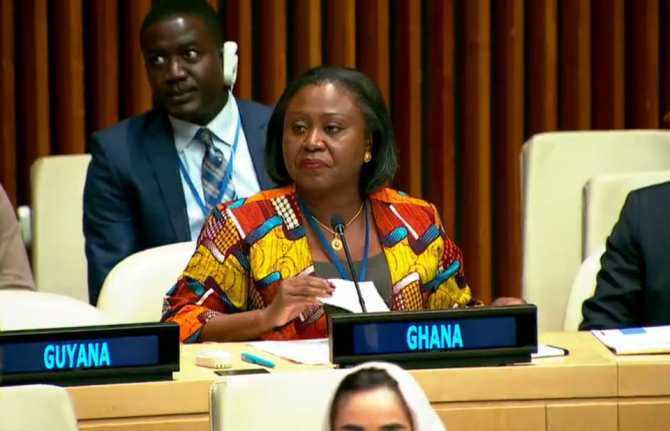
Update
ECOSOC urges countries to Fast-Track the AIDS response
13 July 2017
13 July 2017 13 July 2017The United Nations Economic and Social Council (ECOSOC) has adopted a resolution urging Member States to Fast-Track the AIDS response. They agreed to meet the 2020 milestones and targets as a prerequisite for ending the AIDS epidemic by 2030 and to invest the necessary financial resources.
During a meeting on 7 July, Member States considered the significant progress and outstanding challenges in the AIDS response and the work of the Joint Programme, before adopting the resolution. The meeting was chaired by the ECOSOC Vice-President, Marie Chatardová, Ambassador of Czechia to the United Nations. Ghana and the United Kingdom of Great Britain and Northern Ireland, the Chair and Vice-Chair of the UNAIDS Programme Coordinating Board, co-facilitated Member State negotiation of the resolution and introduced it to ECOSOC.
Quotes
“The Joint Programme has continued to play a critical role in the HIV response and has adapted itself to the changing epidemic and international context. However, at this crucial moment, we are facing a worrying decrease in investments in the response, including investments in the Joint Programme. The resolution acknowledges the unique role of the Joint Programme as an example of a collaborative, multisectoral and inclusive approach in the response to a complex and multifaceted issue. It also stresses the need for the Joint Programme to continue to set the path for reform by revising and updating its operating model.”
“The Joint Programme is assisting countries to realize the commitments of the 2016 United Nations Political Declaration on Ending AIDS, through presence and support of the Joint Programme in more than 100 countries.”
Related

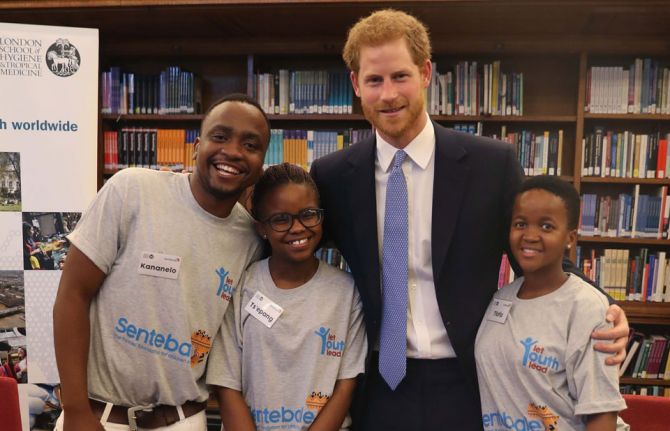
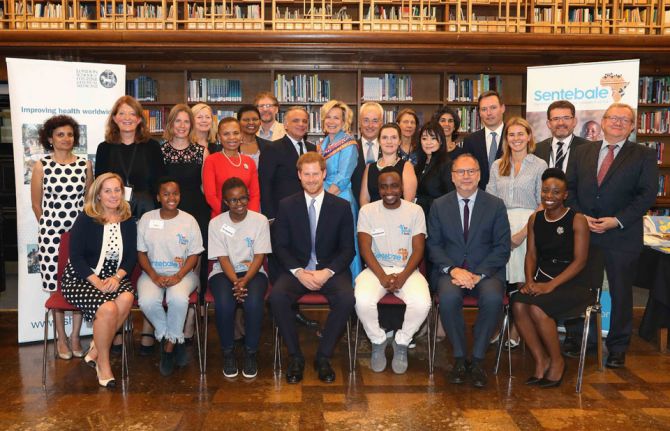
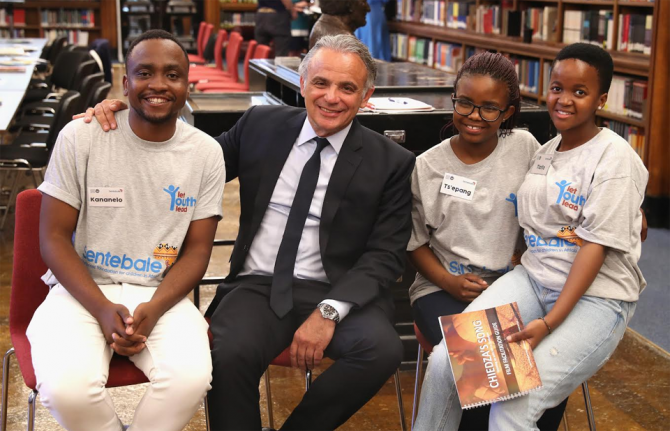
Update
Ensuring that young people living with HIV are not forgotten
13 July 2017
13 July 2017 13 July 2017AIDS is not over and it’s time to remove the barriers around access to HIV testing, treatment, care and support once and for all—these were the messages from an event hosted by Sentebale and the London School of Hygiene and Tropical Medicine on 10 July.
Sentebale, which is Sesotho for “Forget me not”, supports young people living with and affected by HIV by making sure that they are not forgotten. Sentebale was co-founded by Prince Harry, who attended the event, entitled Let Youth Lead.
The event, chaired by the Director of the London School of Hygiene and Tropical Medicine, Peter Piot, was held in London, United Kingdom, and brought together global and regional decision-makers in the AIDS response to discuss the barriers that prevent young people in southern Africa from getting tested for HIV.
UNAIDS is working with countries to achieve the commitment in the 2016 United Nations Political Declaration on Ending AIDS of ensuring that 90% of young people have the skills, knowledge and capacity to protect themselves from HIV and have access to sexual and reproductive health services by 2020, in order to reduce the number of new HIV infections among adolescent girls and young women to below 100 000 per year.
Quotes
“HIV needs to be treated exactly the same as any other disease, and between us hopefully we can eradicate the stigma and give these young people an opportunity to stand up and say, I’ve lived it. I want to come forward and make a difference.”
“I want to give a sense of hope that there is still life if you are HIV-positive. I have a vision of keeping the next generation alive.”
“We need listen to young people and understand what they are going through. Their experiences remind us that we must work together as a global health community, allowing all young people—whatever their HIV status—to lead healthy, happy and productive lives.”
"It is young people themselves that are best placed to inform the HIV response on how to tackle the pending gaps and challenges that affect them. Their participation is not only a matter of inclusiveness, but of the response's effectiveness and sustainability. Initiatives such as Sentebale pioneered by Prince Harry are essential to show how important it is that young people keep being supported, resourced and empowered in their leadership role."
Region/country

Update
Latin American and Caribbean countries endorse bold commitments
06 July 2017
06 July 2017 06 July 2017Latin American and Caribbean countries have adopted the Santiago Commitment to Action for the Implementation of the Global Strategy for Women’s, Children’s and Adolescent’s Health. The Santiago Commitment to Action, which was adopted at the Every Woman, Every Child, Every Adolescent meeting held in Santiago de Chile from 2 to 4 July, saw the countries agree to work to end all preventable deaths, including AIDS-related deaths of women, children and adolescents by 2030, and to develop effective initiatives to ensuring their well-being.
The meeting, hosted by the President of Chile, Michelle Bachelet, saw regional ministers of health and social development and other experts come together. They discussed strategies to reduce inequalities and teenage pregnancy and to promote quality sexual and reproductive health and rights and HIV prevention and care.
The participants recognized that the health of women, children and adolescents is critically important to almost every area of human development and progress, and directly affects the achievement of the Sustainable Development Goals. The participants warned that inequalities affect and worsen overall health in society and represent the greatest threat to regional development.
With the Santiago Commitment to Action, participants agreed to strengthen universal access to health, including HIV-related services, with a human rights and life-cycle approach. They also agreed to develop an integrated programme for women, children and adolescents that guarantees access to HIV services and promotes cooperation and multisectoral actions within and between countries.
The meeting was also an opportunity to formally present the new coordinating mechanism for the Every Woman Every Child Global Strategy for Women’s, Children’s and Adolescents’ Health in the context of Latin America and the Caribbean, which unites seven organizations under the name Every Woman Every Child Latin America and the Caribbean. This initiative leverages the work done by A Promise Renewed for the Americas, which has transitioned to become the regional interagency coordination mechanism for the Every Woman Every Child Global Strategy.
Quotes
“We need each country to develop an integrated programme for women, children and adolescents, strengthening components of the Global Strategy for Women’s, Children’s and Adolescents’ Health.”
“The Sustainable Development Goals are fundamentally about exclusion and inequality. And it is no longer a question of North or South—even within countries there is exclusion. There is a lot to do to end AIDS, and it is fundamental to involve Latin America.”
“Health inequities are not only unjust, they also threaten the advances we have made in the past decades, and endanger economic growth and social development in Latin America and the Caribbean. We have an obligation to ensure that political actions reach the most disadvantaged people first and then gradually benefit every woman, child and adolescent in our region.”
“Health and well-being of women, children and adolescents must be seen as a public good.”
Region/country
Related

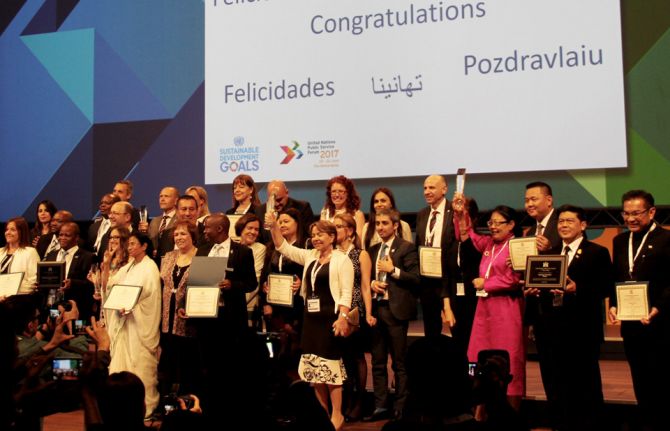
Update
Armenia receives award for elimination of mother-to-child transmission of HIV
06 July 2017
06 July 2017 06 July 2017Armenia has been recognized by the United Nations for its elimination of mother-to-child transmission of HIV programme. The 2017 United Nations Public Service Awards saw Armenia win first prize in the Innovation and Excellence in Delivering Health Services category.
The award was made at the 2017 United Nations Public Service Forum, held in The Hague, Netherlands, on 22 and 23 June to debate how innovative policies can be fostered to implement the 2030 Agenda for Sustainable Development even when resources are scarce, objectives are highly ambitious and interests are disparate.
In 2016, Armenia was one of only four countries to be validated by the World Health Organization for eliminating mother-to-child transmission of HIV.
Quotes
“Maternal and child health protection, including healthy infants born to HIV-positive mothers, are among the major priorities for the health-care system of Armenia. Armenia’s success on elimination of mother-to-child transmission of HIV brings it one step closer to achieving the Sustainable Development Goal of ensuring healthy lives and promoting well-being for all at all ages.”
“This award is a clear signal that Armenia can be among the first countries in eastern Europe and central Asia to achieve an AIDS-free generation and to end the AIDS epidemic.”
Region/country
Related

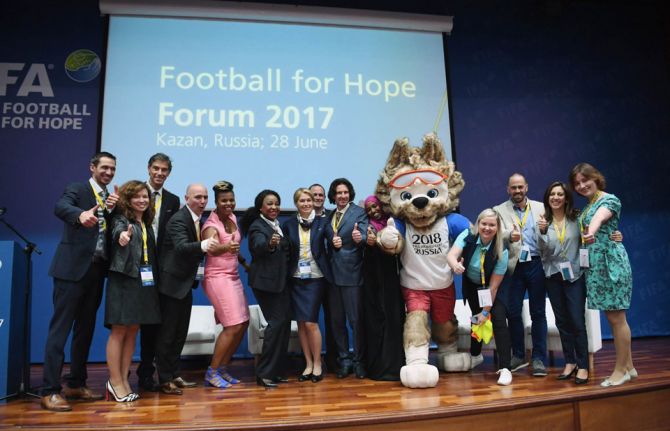
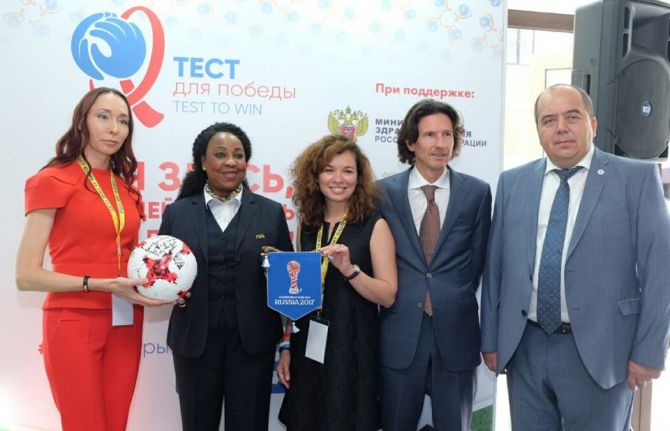
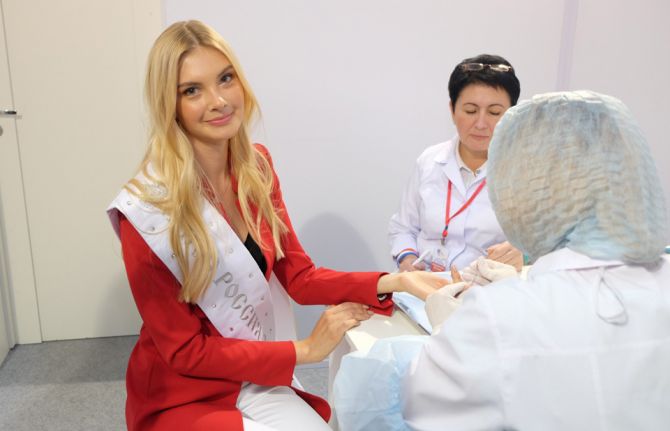
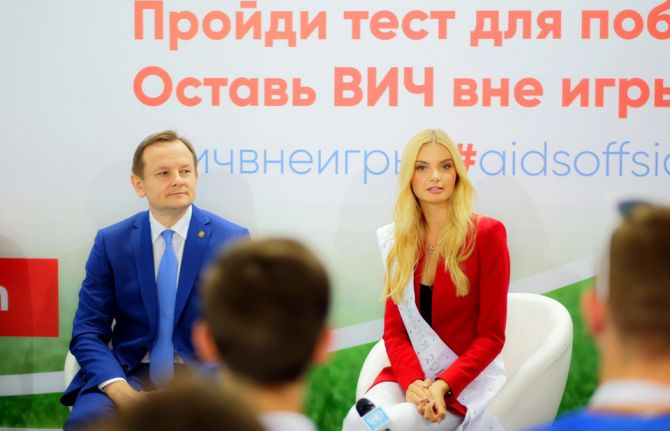
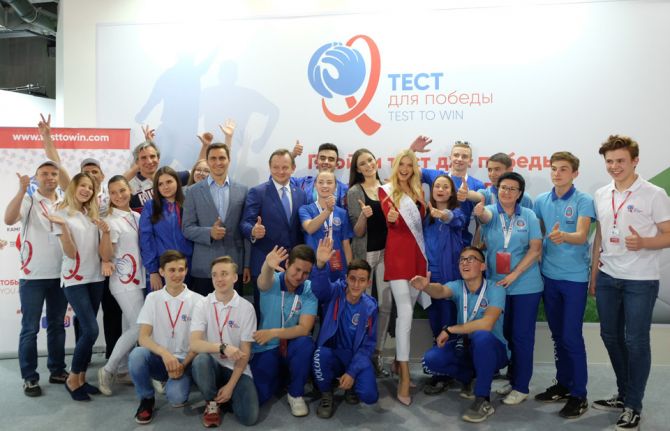
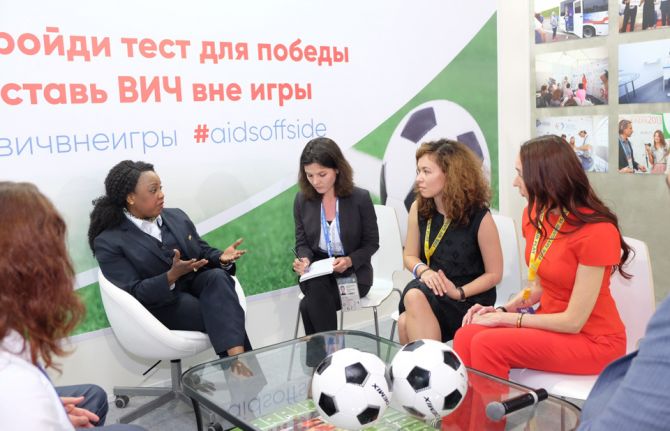
Update
Test to Win at the 2017 FIFA Confederations Cup
06 July 2017
06 July 2017 06 July 2017Free and anonymous HIV testing and counselling were available from the Test to Win pavilion in Kazan, Russian Federation, during the Fédération Internationale de Football Association (FIFA) Confederations Cup, held between 17 June and 2 July.
The pavilion also included an exhibition on HIV and sports and was the scene for workshops, training and appearances by sports celebrities, during which visitors could learn more about HIV. Fatma Samoura, the FIFA General Secretary, visited the pavilion, as did 2018 FIFA World Cup Ambassador Alexey Smertin, Miss Russia 2017, Polina Popova, and the photographer Serge Golovach.
During the two weeks of the competition, more than 3500 people visited the pavilion and received counselling on health issues—more than 1000 of whom were tested for HIV.
The campaign was led by the nongovernmental organization New Century, in partnership with Svetlana Medvedeva’s Foundation for Social and Cultural Initiatives and with support from the Ministry of Health of the Russian Federation, the Republican Center for Prevention and Control of AIDS, the Ministry of Health of Tatarstan and UNAIDS.
On 26 and 28 June, Kazan hosted FIFA’s Forum 'Football for Hope' to promote and develop the use of football as a tool for social development in the Russian Federation and abroad. The forum brought together representatives of nongovernmental organization supported by FIFA’s Football for Hope from all over the globe to share their experiences and successes working in social development in football. The programme included panel discussions with the participation of UNAIDS and others on how football can help to achieve the Sustainable Development Goals.
Quotes
“UNAIDS’ Protect the Goal campaign at previous World Cups used sport to empower young people and adults to access HIV services. I hope that Test to Win will also become a flagship campaign initiative to mobilize people in the Russian Federation and globally.”
“This is not the first project on HIV and sports in Tatarstan and we are happy to continue our collaboration not only in sports with FIFA, but in innovative social development such as HIV prevention and the Test to Win campaign.”
“The most important thing is to involve and convince as many young people as possible. That in no case should you be ashamed to learn more about HIV and get tested. Everyone needs to know their HIV status!”
“FIFA’s Football for Hope demonstrated the global power of football to achieve gender equality, provide access to education, build piece and end AIDS. The Test to Win campaign is another example on how sport can help to reach the 90–90–90 targets.”
Region/country
Related



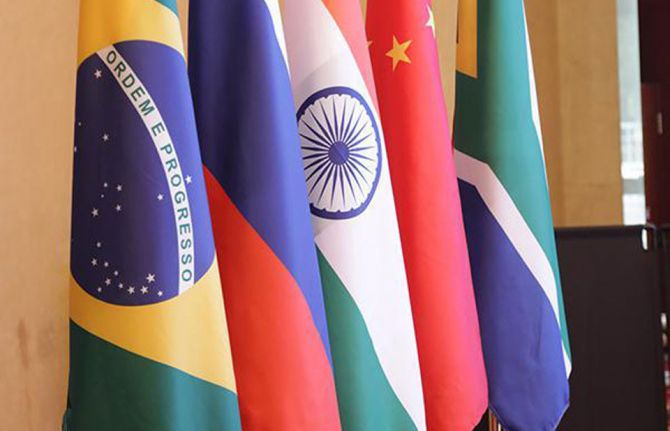
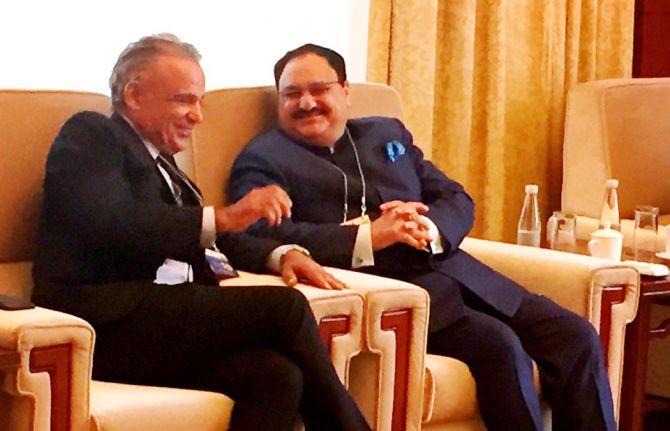
Update
BRICS health ministers agree to strengthen health systems to respond to HIV
06 July 2017
06 July 2017 06 July 2017Health ministers from the BRICS countries (Brazil, the Russian Federation, India, China and South Africa) have agreed to strengthen their surveillance capacity and health-care services to respond to infectious diseases, such HIV, tuberculosis and malaria. They adopted a joint communiqué during the opening ceremony of the BRICS high-level meeting on traditional medicine, which is being held in Tianjin, China, on 6 and 7 July.
The high-level participants noted that while significant progress has been made in the global AIDS response, the epidemic is not yet over. They committed to collective action and sustained leadership to fully implement the 2016 United Nations Political Declaration on Ending AIDS in order to achieve the 90–90–90 targets by 2020 and end AIDS by 2030.
The BRICS countries are home to one third of the 36.7 million people living with HIV globally, and accounted for a third of the 2.1 million new HIV infections in 2015. The countries are taking responsibility for funding their AIDS response, with contributions ranging from 75% to 95% of all resources available for HIV in their respective countries. However, the resources available for the AIDS response in the BRICS countries represent only half of the resources they need to meet the 90–90–90 targets and the other Fast-Track commitments.
Quotes
“The BRICS will strengthen cooperation on innovation in the areas of research and development technology and medical products, as well as intervention policies on key health issues, such as tuberculosis, AIDS and emerging diseases.”
“The BRICS will strengthen collaboration on global health platforms to collectively provide BRICS wisdom and BRICS solutions to meet new health challenges.”
“The BRICS have shown great leadership in funding the AIDS response in their respective countries. However, AIDS is not yet over and countries need to keep up the pace on increasing investments, as well as ensuring the funds are spent smartly on programmes that will have the highest impact.”
Related

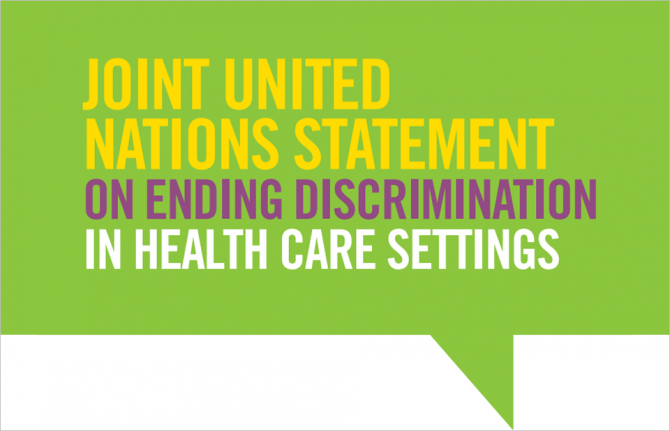
Update
Twelve United Nations agencies commit to working together to end discrimination in health-care settings
30 June 2017
30 June 2017 30 June 2017On 30 June, 12 United Nations entities released an unprecedented joint statement calling for ending discrimination in health-care settings and committing to work together to support Member States to provide health-care services free from stigma and discrimination. The statement is a powerful call to action for governments to do more to address discrimination in all its different forms and will contribute to the achievement of many of the Sustainable Development Goals, ensuring that no one is left behind.
Discrimination in health-care settings is directed towards some of the most marginalized and stigmatized populations, the very populations that states promised to prioritize through the 2030 Agenda for Sustainable Development and who are all too often excluded or left behind.
Discrimination affects both the users of health-care services and health-care workers. It serves as a barrier to accessing health services, affects the quality of health services provided and reinforces exclusion from society for both individuals and groups.
Many individuals and groups face discrimination on the basis of their age, sex, race or ethnicity, health status, disability or vulnerability to ill health, sexual orientation or gender identity, nationality, asylum or migration status, or criminal record, often experiencing intersecting or compounding forms of discrimination.
Discrimination in health-care settings takes many forms and is often manifested when an individual or group is denied access to health-care services that are otherwise available to others. It can also occur through denial of services that are only needed by certain groups, such as women. Examples include specific individuals or groups being subjected to physical and verbal abuse or violence, involuntary treatment, breaches of confidentiality and/or denial of autonomous decision-making, such as the requirement of consent to treatment by parents, spouses or guardians, and lack of free and informed consent.
The agencies supporting the statement are the UNAIDS Secretariat, the Office of the United Nations High Commissioner for Refugees, the United Nations Children’s Fund, the World Food Programme, the United Nations Development Programme, the United Nations Population Fund, UN Women, the International Labour Organization, the United Nations Educational, Scientific and Cultural Organization, the World Health Organization, the Office of the High Commissioner for Human Rights and the International Organization for Migration.
Related

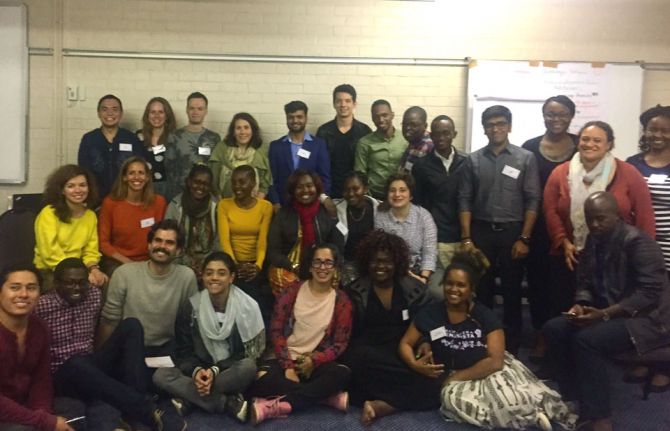
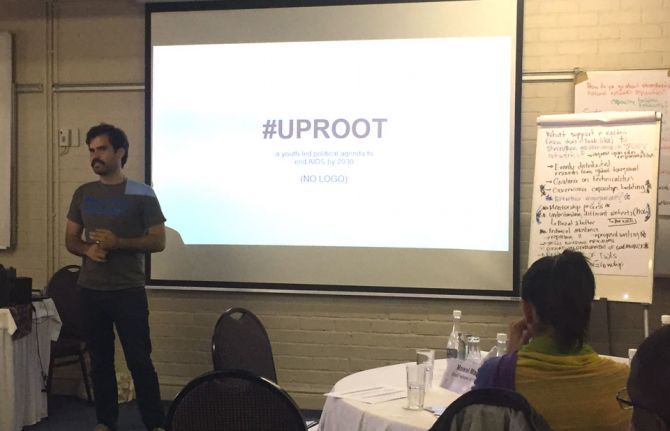
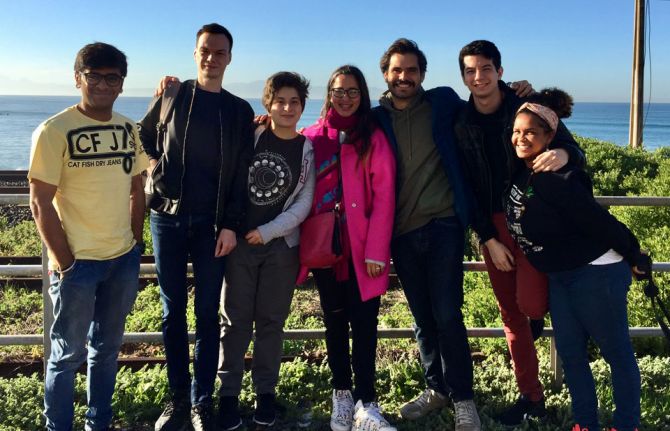
Update
Moving forward with positive youth leadership
03 July 2017
03 July 2017 03 July 2017Young people are critical to achieving the targets of the 2016 United Nations Political Declaration on Ending AIDS. While young people living with HIV are playing an active role in the AIDS response by providing information, care and peer support, their networks need more support and resources.
To advance efforts to engage young people living with HIV in decision-making on issues that affect their lives, 40 young people from 19 countries representing networks of young people living with HIV met in Cape Town, South Africa, on 19 and 20 June. The Intergenerational Summit for Positive Youth Leadership was held with support from UNAIDS, the Adolescent Treatment Coalition and partners.
The objectives of the meeting included analysing the capacities of networks of young people living with HIV, identifying barriers and opportunities for participation and facilitating a dialogue on how young people living with HIV, and their networks, can be strengthened.
Attending the meeting was Yana Panfilova, a young leader from Teenergizer!, the Ukranian and Eurasian Union of Adolescents and Youth Organizations. She said, “Interruptions and lack of motivation for antiretroviral therapy, discrimination and self-stigma, lack of quality prevention education and barriers to access HIV testing are key challenges faced by adolescents living with HIV in eastern Europe and central Asia.”
Chinmay Modi, a board member representing youth and adolescents in the National Coalition of People Living with HIV in India, said, “Stigma and discrimination remains a key barrier to engaging adolescents and young people living with HIV in the AIDS response.”
While young people are advocating for greater political commitment and action to address the challenges, they are also responding to them through their networks. Moises Maciel, a representative of the National Network of Adolescents and Youth Living with HIV/AIDS in Brazil, said, “The main mission of our social movement is to group, welcome and support adolescents and young people living with HIV. We advocate and take action to strengthen public policies against the stigma and impact of HIV.”
Carlo Andre Oliveras, Coordinator of the Adolescent HIV Treatment Coalition, said, “We see that the majority of work is done by adolescents and young people on a volunteer basis without any financial support and mentorship. This meeting is a start to assess where we are in our movement. Today, the world is facing many challenges; we should not lose sight of the opportunity to make things better.”
“My take-away message from this meeting is that every network can improve their work if we have a more horizontal coordination, if we share our accomplishments and failures, our success and difficulties. I am leaving this meeting feeling empowered, and as soon as I am back in Brazil I’ll use this power to change things for real,” said Mr Maciel.
Region/country

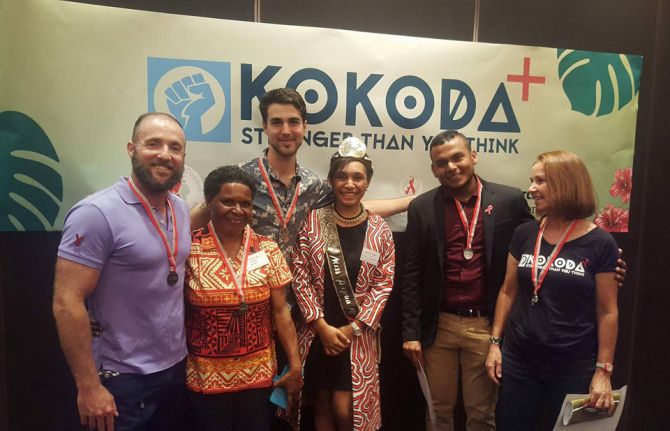
Update
Braving the Kokoda trail to raise HIV awareness in Papua New Guinea
03 July 2017
03 July 2017 03 July 2017The Kokoda trail winds through the Owen Stanley Range in Papua New Guinea and is billed as one of the world’s most challenging treks. Nearly 100 km long, the track goes through rugged mountainous terrain and hikers are buffeted by hot and humid days followed by intensely cold nights. Carol Habin is a member of the national organization of people living with HIV in Papua New Guinea, called Igat Hope Inc., and she decided to raise HIV awareness by hiking the trail in June. She joined a group of around 20 people from Australia, which also included HIV-positive people.
“As a woman who works in HIV advocacy programmes, I have come to realize that women are vastly underrepresented in my country,” said Ms Habin. “Violence against women in Papua New Guinea is extremely high. I wanted to walk the trek to not only raise awareness about HIV stigma and discrimination, but also to empower women living with HIV and to make sure their voices are heard.”
The initiative Ms Habin joined was led by the HIV Foundation of Queensland under the Kokoda+Stronger Than You Think project. UNAIDS supported the mobilization of resources for Ms Habin’s participation in the trek. The team was led by Ji Wallace, who is an Australian living with HIV and an Olympic athlete.
“With a lot of work, we can change the attitude of the community,” said Mr Wallace. “It may not happen overnight, but we have the power within us to change.”
The trekkers took eight days to complete the hike. They conducted HIV awareness sessions with people living in villages along the track.
“I was surprised to find out how little the villagers knew about HIV,” said Ms Habin. “This initiative was very helpful in getting them to understand people living with HIV. I think also thanks to media coverage we have helped transform the way the public views HIV-positive people. I’ve shown everyone that as a woman living with HIV I can do anything, even hike one of the world’s toughest trails.”
Papua New Guinea has the largest HIV epidemic in the Pacific Islands. In 2015, there were 40 000 people living with HIV in the country and 2700 new HIV infections. The country is one of the few in the Asia and the Pacific region in which women are at higher risk of HIV than men, with 56% of new HIV infections occurring among women.
“I particularly want young women to understand they can say no to sex and stand up for their rights,” said Ms Habin.
The hikers completed the hike in late June and returned to Port Moresby for a celebration. UNAIDS Papua New Guinea Country Director David Bridger congratulated the team.
“Papua New Guinea has made immense progress in its HIV response,” said Mr Bridger. “But until the fear that generates misconceptions and breeds stigma is overcome, the AIDS epidemic will continue to claim lives. The Kokoda+Stronger Than You Think initiative is an innovative way to help break down misconceptions and celebrate the strength of people living with HIV. I congratulate your efforts.”
Ms Habin plans to build on the initiative and work with the Government of Papua New Guinea to encourage more people to take HIV tests and adapt HIV prevention to the needs of young women.




















